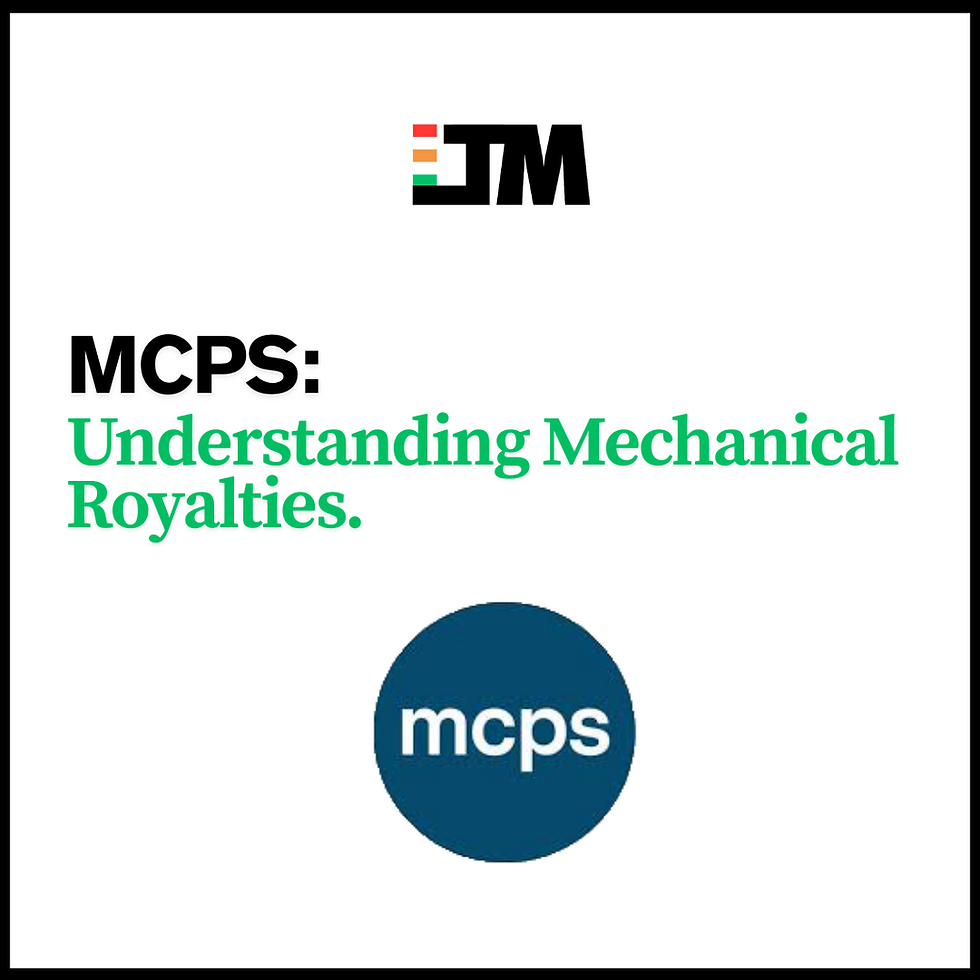PRS for Music: The Complete Guide for UK Songwriters & Composers
- edbrown2879
- May 8, 2025
- 3 min read
If you write music—whether it's pop songs, film scores, or even jingles—you're owed performance royalties every time your work is played publicly.
PRS for Music is the organisation that collects these royalties on your behalf.
But how exactly does PRS work? How much can you earn? And what mistakes do most musicians make when registering?
This ultimate guide covers everything you need to know—from signing up to maximising your payouts.
What is PRS for Music?
PRS (Performing Right Society) is the UK’s leading royalty collection society for songwriters, composers, and publishers. It ensures you get paid when your music is:
✔ Performed live (gigs, festivals, cover bands)
✔ Broadcast (TV, radio, podcasts)
✔ Streamed (Spotify, Apple Music, YouTube)
✔ Played in public (shops, gyms, restaurants)
Who Should Join PRS?
✅ Songwriters (original music)
✅ Composers (film/TV/game scores)
✅ Publishers (if you own publishing rights)
❌ Performers only (unless they also wrote the song, performers shouldn't sign up as they won't earn any royalties. If you only perform but didn’t write the music, you need PPL, not PRS.)
How PRS Royalties Work
PRS tracks music usage through:
Radio/TV logs (BBC, Sky, Netflix)
Digital platforms (Spotify, Apple Music)
Venue reports (pubs, clubs, festivals)
They then distribute royalties quarterly (whenever you earn over £30.
How Much Can You Earn?
Usage Type | Estimated Earnings |
BBC Radio 1 Play | £14 per minute |
Local Radio Play | £1 - £10 per minute depending on radio size/reach |
Spotify Stream | £0.0024 per stream (PRS percentage split between them and PRS is around 60:40) |
Live Gig | £5+ (Massively dependant on venue size, songs played and length of time played.) |
These are rough estimates—actual rates will vary.
1. How Do I Register with PRS?
Step 1: Go to PRS for Music
Step 2: Choose "Writer"
Step 3: Pay the £100 membership fee
Step 4: Submit your works (manually or via your distributor)
2. How Are PRS Royalties Calculated?
PRS uses sampling and usage data to estimate payments. Factors include:
Type of usage (national radio pays more than a café)
Song length (longer tracks earn more)
Your ownership % (split with co-writers if it is not a solo writing venture)
Example:
A 3-minute song played on BBC Radio 1 could earn around £42.
The same song streamed 100,000 times on Spotify could earn £240.
3. Does PRS Cover All Streaming Royalties?
No! PRS only collects performance royalties from streaming.
Mechanical royalties (for reproductions) are handled by MCPS.
Performers royalties are handled by PPL
4. What’s the Difference Between PRS and PPL?
PRS | PPL |
Pays songwriters/publishers | Pays performers/labels |
Covers compositions | Covers recordings |
Live gigs, radio, streaming | Radio, TV, public broadcasting, streaming |
Example:
If Ed Sheeran’s "Shape of You" plays on Radio 1:
PRS pays Ed (the songwriter).
PPL pays Ed (the performer) + his label.
Common PRS Myths Debunked
❌ "I’m Too Small to Earn Royalties"
Even unsigned artists earn from:
Local radio plays
Pub gigs (if the venue has a PRS license)
YouTube monetization
Streaming
International Radio Plays
❌ "PRS Takes a Huge Cut"
They deduct 10-15% admin fees—far less than losing 100% of unclaimed royalties.
How to Maximise Your PRS Earnings
1. Log All Live Performances
Use PRS Gigs to report concerts, covers, and festivals.
2. Check for Missing Royalties
PRS’s Music Recognition Service scans for unclaimed tracks.
3. Join the PRS Members’ Council
Influence policy and get priority support as an active member.
Final Thoughts
PRS is essential for all UK songwriters. Even if earnings start small, they add up over time—especially if your music gets radio play or sync placements.
Ready to join? Sign up for PRS here.
Got More Questions?
Drop them in the comments or check out my YouTube Video Series where I break down real royalty statements!
Up Next in This Series:
MCPS – Understanding Mechanical Royalties
The Ultimate Guide to UK music royalties: PRA, PPL & MCPS Explained




Comments